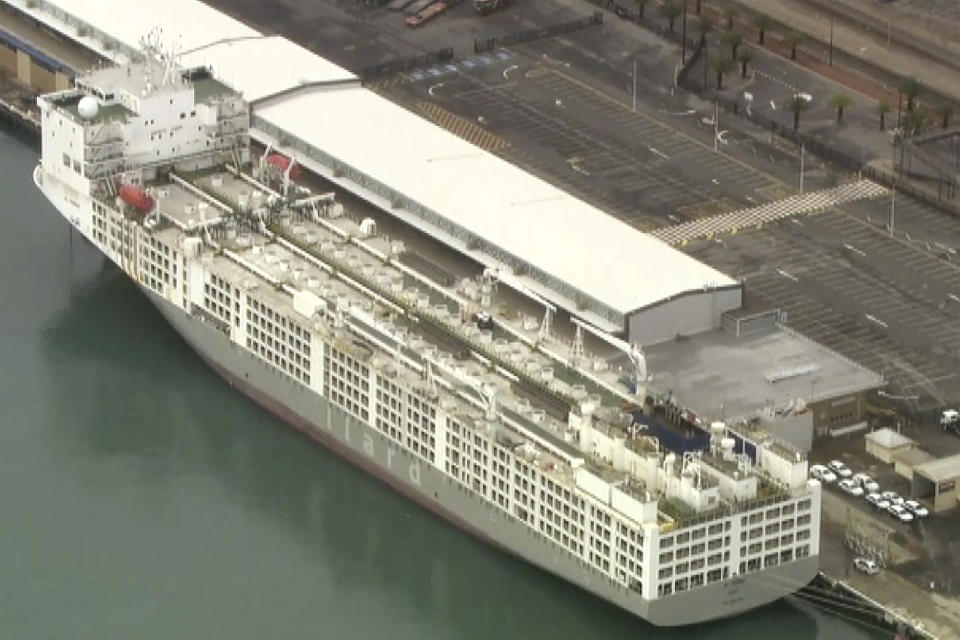Coronavirus cluster found in cargo ship in Australia
CANBERRA, Australia (AP) — A coronavirus cluster was detected Tuesday on a freight ship berthed in the Australian west coast port of Fremantle, raising questions about why local authorities weren’t alerted to the danger.
Six of 48 crew members from the Al Kuwait tested positive for the virus four days after the livestock carrier arrived from the United Arab Emirates on Friday, Western Australia state Premier Mark McGowan said.
The six infected crew were transferred to hotel quarantine in the nearby city of Perth while health officials consider what to do with the remaining 42 on board, he said.
The ship’s cargo of 56,000 sheep is being held at a feedlot near the port. They were to be loaded within days and cannot be returned to farms because of quarantine restrictions, McGowan said.
Authorities expect more crew members will get sick and the ship will need a deep cleaning before it can leave.
Two federal government departments strongly disagreed with the Western Australian government's account of how the Kuwait-registered ship was permitted to dock.
McGowan said the Al-Kuwait left the United Arab Emirates on May 7 and was given permission by Australia’s Department of Agriculture, Water and Environment last Wednesday to berth at Fremantle despite the vessel's report that three crew members had elevated temperatures.
Agriculture Minister David Littleproud told Australian Broadcasting Corp. the ship's master had reported “three deckhands were sick, but did not have the symptoms of COVID-19.”
The premier said Australian Border Force gave final approval on Friday for the ship to dock at Fremantle despite the ship's master reporting one crew member running a high temperature and three showing similar symptoms in the previous 15 days.
Australian Border Force denied in a statement receiving any reports of illness on board.
Littleproud said his department was first advised by the ship's agent the day it docked in Fremantle that someone on board had a fever and COVID-19 symptoms.
Littleproud said he had requested proof from his department that it had immediately alerted Western Australian health authorities, but had not yet received any proof.
“I want to make sure that they did exactly what they said they did,” Littleproud said of department officials.
“Before we start raising anxiety in the community, it's important we get through this calmly and work through with fact and evidence,” he added.
McGowan said a port official followed usual procedure by wearing personal protection equipment and boarding on Friday to help steer the ship into a berth,
"At this point, the Fremantle Port Authority was not made aware of the health concerns,” McGowan said.
The Port Authority did not discover the virus risk until one of its own employees raised the alarm on Sunday, McGowan said.
Six port workers including the pilot had been on board by then, officials said.
McGowan said the pilot has been placed in quarantine. He said no locals should have been allowed on the ship.
“We’re very concerned and, to a degree, disappointed, but we’re trying to find out who knew what and when so that we can learn lessons from this,” McGowan said.
The government is working with the ship’s agent to arrange for it to leave as soon as possible, he said.
The sheep were to be the last shipped to the Middle East before a three-month federal export ban takes effect on June 1. Live exports are banned during the Northern Hemisphere summer to reduce animal suffering from heat stress.
Littleproud said there were animal welfare issues to be worked through with the exporter with the shipment now in doubt. An export industry spokeswoman, Holley Ludeman, said the sheep could remain at the feedlot for months at their owners' expense for feeding.
Western Australia last year exported 1 million live sheep for 136 million Australian dollars ($90 million) for meat to nine countries, mostly in the Middle East. But animal activists want the trade to end on cruelty grounds.




